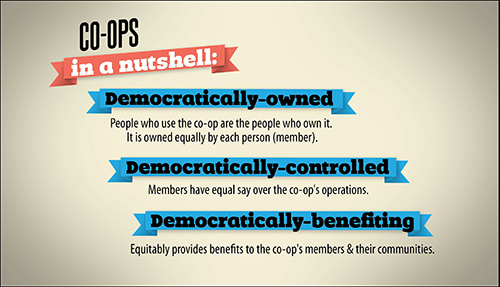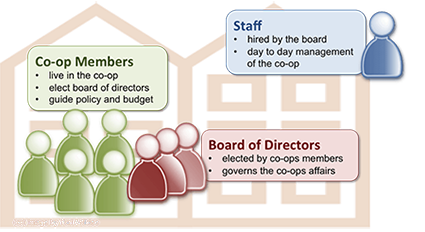 There are over 2000 housing co-operatives in Canada, housing about 111,000 households. They come in many shapes and sizes, from small – medium sized townhouse complexes to large apartment buildings with hundreds of units. Most housing co-operatives in Canada are non-profit, meaning that members cannot sell their shares and the housing is operated on a break-even basis.
There are over 2000 housing co-operatives in Canada, housing about 111,000 households. They come in many shapes and sizes, from small – medium sized townhouse complexes to large apartment buildings with hundreds of units. Most housing co-operatives in Canada are non-profit, meaning that members cannot sell their shares and the housing is operated on a break-even basis.
In many ways, a housing co-op looks like any other private rental. However, there are some very important differences:
- Democratic control: co-ops are governed by the people who live there, who are called members. Members make important decisions about what happens in the co-op. They elect a Board of Directors who oversee the governance of the co-op. Members approve the annual budget and audited statements, and make decisions about policies and rules in the co-op. They do this by exercising their votes at General Meetings. There is no landlord.
- Affordability: Housing co-ops are mixed income communities that house people of various income levels. Some members receive rent-geared-to-income subsidy, which reduces their housing charge (the co-op term for rent) to an affordable level. The money for this subsidy is usually provided by the government. The co-op administers these funds and ensures they are spent fairly and within the government guidelines. The members who do not receive RGI subsidy pay the market housing charge, which is set by members. Because co-ops are non-profit, the market housing charge is set to a level to ensure that the co-op is able to manage its expenses.
- Community: Housing co-ops strive to create strong communities where members participate actively in the running of the co-op. Members are encouraged to contribute some of their talent to the co-op to make it a healthy and safe place to live. This can be anything from maintaining common area gardens to organizing a pot-luck or decorating the lobby for Christmas. By contributing some of their skill and talent, members contribute to a sense of community and also occasionally save the co-op money. Some co-ops have committees which oversee a particular aspect of the co-op.
- Security of tenure: members can live in housing co-ops for as long as they want, as long as they follow the rules of the co-op and pay their housing charge (rent) on time. There is no fixed lease. You stay for as long as you wish.


